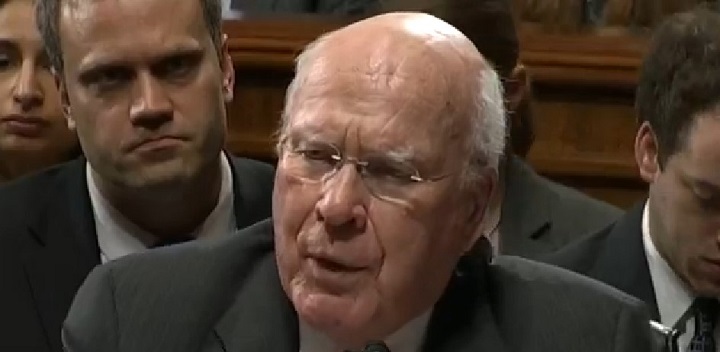Committee vote on Attorney General nomination delayed, acting AG fired

On Capitol Hill, half a dozen committee votes on cabinet nominations were scheduled Tuesday, but not all made it that far. The Health, Education, Labor and Pensions Committee advanced Betsy DeVos, the nominee for Education Secretary, despite her total lack of experience with the public education system, personal ties with student loan companies and deep financial support for the GOP. The Energy and Natural Resources Committee also advanced two nominees: former oilman and Texas Governor Rick Perry for Energy Secretary and Montana Representative Ryan Zinke as Interior Secretary.
But other hearings were more contentious. Senate Democrats boycotted the Finance Committee, stalling the meeting where votes were set for Treasury nominee Steven Mnuchin and Health and Human Services nominee Tom Price.
And the Senate Judiciary Committee, clearly split along party lines, took their time making remarks ahead of a vote on President Trump’s pick for Attorney General. FSRN’s Nell Abram has more.
“It is very difficult to reconcile, for me, the independence and objectivity necessary for the position of Attorney General with the partisanship this nominee has demonstrated,” California Senator Diane Feinstein began the Democrats’ detailed descriptions of why they would not support Alabama Senator Jeff Sessions for the post of U.S. Attorney General. Citing his record on reproductive rights, voting rights, torture, and civil rights, lawmakers listed the arenas in which they doubt Sessions would defend the legal rights of U.S. citizens.
Denied a seat on the federal judicial bench in the 1980s after allegations of racism, Sessions says his record proves those claims false.
But Senator Patrick Leahy said that Sessions has an unwillingness to protect the nation’s most marginalized communities.
“Time and again, when the rights of women, of LGBTQ individuals, disenfranchised communities have been debated here in the Senate, Senator Sessions has not sought to protect the civil human rights, too often he has been the one, sometimes the only one, standing in the way,” the Vermont lawmaker said. “In 2009, Senator Sessions opposed extending hate crime protections to women and LGBT individuals – groups that have been historically targeted based on merely who they are. He stated, ‘I am not sure women or people with different sexual orientations face that kind of discrimination. I just don’t see it.’ Well, open your eyes and you will see it.”
Twelve days into the Trump presidency, the rash of executive orders and presidential memoranda already issued were front and center for lawmakers like Feinstein, uncertain about ability to separate political allegiance from the legal underpinnings of the orders.
“The president’s nominee, a colleague of ours for some 20 years, is well known for his positions and point of view. He’s been a staunch campaign partisan for the president. He has reinforced and supported the Trump mission, style, rhetoric, and views,” Feinstein points out. “He was the first senator to endorse. He has attended at least 45 trump campaign events. He wore the hat. He was a leading voice.”
The hastily implemented ban on immigrants and travelers from seven Muslim-majority nations, was repeatedly cited.
The California Senator said the Attorney General must administer justice fairly and impartially for all Americans: “We’re being asked to vote on a nominee that will have to stand up to a president who is clearly willing to ignore the law and even issue orders in violation of the constitution.”
Monday, Acting U.S. Attorney General Sally Yates did just that, instructing Department of Justice staff not to legally enforce the travel ban. Within hours, President Trump fired her.
“And what we saw last night illustrates what is at stake with this nomination. I’ve said and I believe that the president’s decision to fire acting Attorney General Sally Yates is shameful,” said Vermont Senator Leahy. “His accusation she betrayed Department of Justice is dangerous. The Attorney General is a people’s attorney, not the president’s attorney.”
Yates was confirmed as Deputy Attorney General in 2015. During her confirmation hearings, as a member of the Senate Judiciary Committee, Sessions had similar concerns about Yates’ willingness to stand up to a presidential order.
“You have to watch out, because people will be asking you to do things you just need to say no about. Do you think the Attorney General has a responsibility to say no to the president if he asks for something that’s improper?” Sessions asked Yates. “A lot of people have defended the Lynch nomination, for example, by saying, ‘Well, he appoints somebody who’s going to execute his views. What’s wrong with that?’ But if the views a president wants to execute are unlawful, should the Attorney General or the Deputy Attorney General say no?”
“Senator, I believe that the Attorney General or the Deputy Attorney General has an obligation to follow the law and the constitution and to give their independent legal advice to the president,” Yates responded.
In a departure from rules enforced in other committees during confirmation proceedings, Judiciary Committee Chair Chuck Grassley allowed unfettered remarks ahead of the vote. Senators cycled through the committee as they came and went to cast votes in other Congressional venues, often dropping the committee below quorum and stalling the proceedings.
The final committee vote was delayed until Wednesday – when lawmakers are expected to advance Senator Sessions along party lines, sending his nomination to the full chamber for a final vote.











